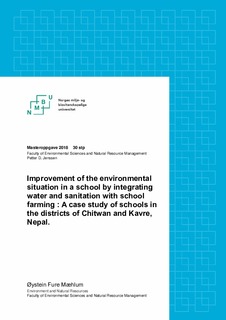| dc.contributor.advisor | Jenssen, Petter D. | |
| dc.contributor.advisor | Manoj, Pandey | |
| dc.contributor.author | Mæhlum, Øystein Fure | |
| dc.coverage.spatial | Nepal | nb_NO |
| dc.date.accessioned | 2018-10-29T14:04:05Z | |
| dc.date.available | 2018-10-29T14:04:05Z | |
| dc.date.issued | 2018 | |
| dc.identifier.uri | http://hdl.handle.net/11250/2569984 | |
| dc.description.abstract | Nepal is one of the poorest developing countries in Asia. Political tension and nature disasters has severely stunted development the last few decades. At the same time, modernization trends from the western world are adopted without realizing the consequences they may bring. This has especially been an issue for Water, Sanitation and Hygiene (WASH) where water and wastewater has been poorly managed. The current trend is to dump untreated sludge in lakes, rivers, streams or soak pits that contaminate groundwater and lead to eutrophication in lakes and rivers.
Traditionally in Nepal, all sludge was put back to agriculture. However, with the modernization of toilet facilities, recycling of human waste has been going out of fashion. One measure to counteract this negative trend is implementation of ecological sanitation (EcoSan). EcoSan recognizes the value of human excreta, where EcoSan toilets are designed to recycle human waste for agricultural purposes. Introduction of EcoSan in schools is a great way of building acceptance for these kind of solutions in the community. With the nutrients recycled from excreta, a school kitchen garden can easily be maintained. This is a great arena for students to learn science and importance of nutrition.
A knowledge Attitude and Practice (KAP) survey designed to uncover WASH customs, general acceptance of human excreta recycling and health related issues was conducted in two different study areas. The study areas are Jana Jeevan Secondary school in the district of Chitwan and Jana Hit secondary school in the district of Kavre. They are upgrading their sanitation facilities and have expressed a wish to utilize EcoSan systems for nutrient recovery. The KAP surveys showed a positive attitude towards human excreta recycling among the surrounding community. The state of WASH was good in the more developed district of Chitwan and more lacklustre in Kavre. This was particularly visible in hygiene habits among the students of Jana Hit.
The new sanitation system of Jana Jeevan will have urine diversion and a biogas reactor with sludge dewatering beds. Urine will be transported with pipelines next to the school kitchen garden. Jana Hit in Kavre have recently built a new sanitation system with septic tanks. Urine diversion is possible to implement, but building a new sludge handling facility was not seen feasible. However, sludge dewatering are possible to implement if they find the space for them. | nb_NO |
| dc.description.sponsorship | NORHED | nb_NO |
| dc.language.iso | eng | nb_NO |
| dc.publisher | Norwegian University of Life Sciences, Ås | nb_NO |
| dc.rights | Attribution-NonCommercial-NoDerivatives 4.0 Internasjonal | * |
| dc.rights.uri | http://creativecommons.org/licenses/by-nc-nd/4.0/deed.no | * |
| dc.title | Improvement of the environmental situation in a school by integrating water and sanitation with school farming : a case study of schools in the districts of Chitwan and Kavre, Nepal | nb_NO |
| dc.type | Master thesis | nb_NO |
| dc.description.version | submittedVersion | nb_NO |
| dc.subject.nsi | VDP::Teknologi: 500::Miljøteknologi: 610 | nb_NO |
| dc.description.localcode | M-MINA | nb_NO |

